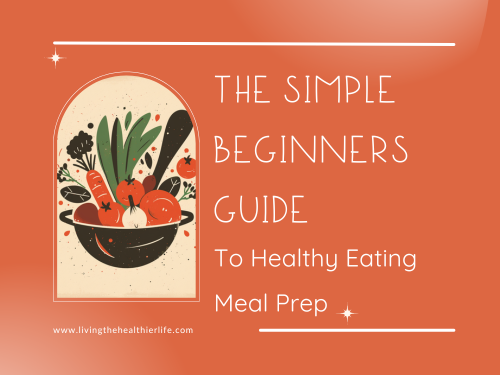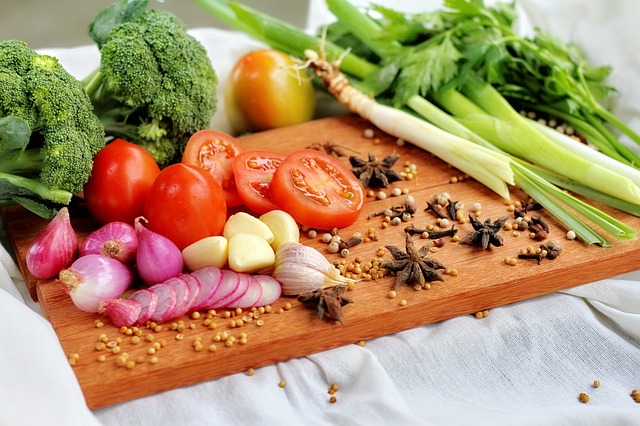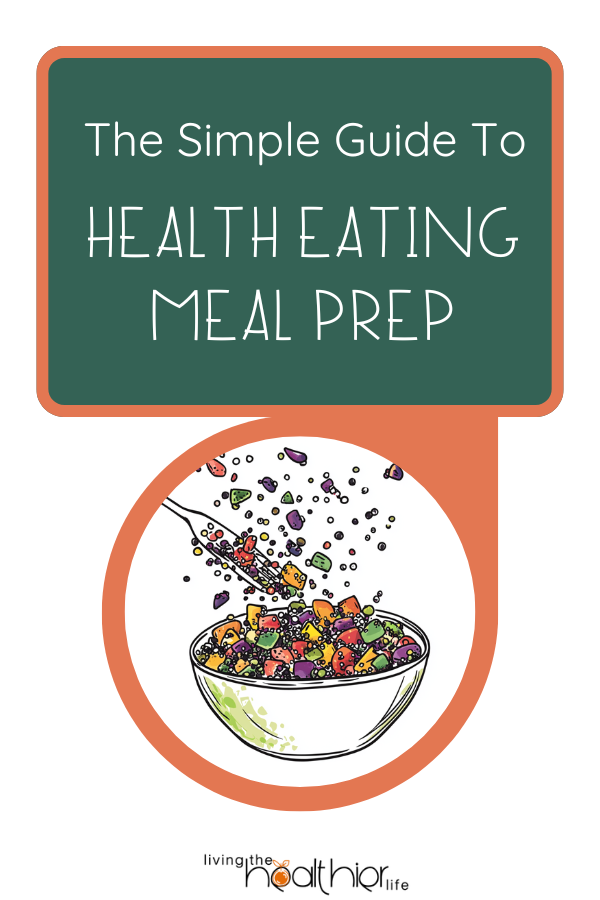If you’re unfamiliar to the art of prepping an entire week’s worth of meals, it can seem like a daunting task. Not surprising that so many people, particularly beginners, struggle to get going with it. Of course, those prepping pictures on Instagram look appealing when photographed in flattering filters, but how many of us can honestly say we want to do all that hard work?
Well, the good news is that it actually isn’t as hard as it looks, providing you follow a few simple tips and tricks.
Here, I’ll walk you through the basics of prepping a healthy eating menu for your whole family, stuff you should definitely do to make it easier, and how to avoid some common pitfalls that cause many people to give up before they’ve even started.
Disclaimer – this post contains affiliate links. For more information, please visit my disclosures page

What Is Meal Prepping?
Meal prepping is really about preparing all your meals in advance – often for a full week ahead of time. It involves coming up with a list of breakfast, lunches and dinners, buying in the ingredients, prepping and cooking the recipes, and storing in containers in the fridge or freezer. It’s become something of a craze in recent years, with many big online influencers showcasing their prepping skills and recommending meal prepping for a wide variety of benefits, including calorie counting, portion control, financing and budgeting, and time management (especially those with big families).
Why Meal Prep?
There are three big reasons why you might have considered prepping your meals, or why someone has recommended it to you: Budgeting, healthy eating and to save time. Let’s look at whether the evidence stacks up.
Can Prepping Reduce Your Food Bill?
Many experts in the field of budgeting and family financing recommend meal prepping as a way of saving money on your weekly food bill. There is some evidence behind this. This report says that the typical family throws away a staggering 24 meals a month, and often this is down to poor planning – you buy a pack of mushrooms to use in a chicken noodle soup, use half the pack, forget about the rest, and end up throwing it away the next time you clear out the fridge.
So meal prepping can definitely help reduce your food waste, providing you plan meals that use the ingredients you buy, and help you reduce your food waste. Which we should all be doing any, for the environment if nothing else.
Will Prepping Help You With Your Diet?
If your goal is to eat a healthy diet or lose weight, prepping is definitely the way to go. There’s a term called decision fatigue, where your brain gets tired as the day moves on, because of the number of decisions it has to process. By the time you return home after a long busy day, the last thing your brain wants to do is make a decision on something healthy and nutritious to eat. By weekly planning, you are removing that job entirely from all the things you are asking your brain to do.
If you are calorie counting or macro counting on a specific diet, I’d definitely recommend buying a ready-made meal plan to save you the effort of working out the nutritional content of each of your meals (I’m a huge fan of Joe Wick’s meal plans – he recommends meal prepping on his diet and I love his recipes – they are super-easy, low carb and very filling). The time it saves you will definitely be worth the upfront cost.
Will It Help You If You’re Busy (And Stressed)?
Many productivity experts recommend meal prepping as a great way to save time during the week. Plan and prep your meals in one go, with one single weekly effort to wash up, cut veg, season meat, and you’ll save yourself hours across the week. If you have time each week that you can set aside for meal prepping, then it is definitely going to help you manage your schedule. That’s great if you have lots of things planned in the early evening and don’t want to think about cooking when you return home.
Top Tips To Succeed At Meal Prepping
Nutritional content

I’m going to assume you jumped on to this post because it’s got healthy eating in the title, so the nutritional value of the meals you are preparing is important to you. And I’m not going to use this post to explain what is or isn’t nutrition.
I am personally interested in Keto and low carb. But people have their own diets and their own preferences, so stick to what you know.
But I will give some simple advice here. If you want nutritionally balanced meals, buy a meal plan like this one rather than doing it yourself! Honestly, I know some people suggest just downloading an app and putting in all your calories and macros and whatnot, but doing that on top of meal planning is going to be cumbersome and lengthy (trust me, I’ve done it – it takes a lot of time!). There are plenty of meal plans out there on the internet already – free ones, or the ones you pay for, so take that job off your list and make life a little bit easier from the start.
If in doubt, go for meals that use largely unprocessed ingredients (or as few processed ingredients as possible). I always think that’s a good rule to follow if you want to stay healthy but aren’t following a particular type of diet. If it’s made in a factory rather than a farm or in the wild, it’s probably not that good for your body.
Prep meals that freeze well
Go for food that is going to freeze well. I’m sure you’ll know from past experience that some foods work far better than others when it comes to defrosting. I think chilli con carne is a good example. It always seems to taste better after it has been frozen.
And don’t forget to label your containers before they go in the freezer!
Use common ingredients
If you’re new to meal prepping, the sheer idea of chopping up dozens of ingredients can seem so daunting that it stops you from even giving it a go in the first place. So start simple when it comes to ingredients. If you’ve found a nice chilli recipe that asks for chopped carrots, go with another midweek meal that requires the same – Bolognese for example. It’s also a great way to make sure you aren’t going to throw away unused perishables, like a particular type of cheese called for in a recipe.
Buy good quality containers
Food containers need to be robust, so don’t go for the cheapest option. Look for something strong, long-lasting with good seals, and ones that are going to be easy to wash, like these.
Invest in good quality kitchen equipment
Buy a good knife. You’ll be chopping, slicing and dicing and you’ll want a good sharp knife to make that job as quick and painless as possible. And if your knife skills aren’t that great, take a quick look at this youtube video below on how to chop veg. It’s worth learning how to do it properly and can save you a lot of time.
Other things it’s worth investing in: good digital scales, a blender and a mixer.
Quality ingredients over quantity
When I’m talking about quality ingredients, I’m really talking from a health perspective. After all, if you’ve gone to all the effort of planning and prepping a week’s worth of meals. There’s no point in ruining it with cheap, preservative-laden processed food. Try and go for local, seasonal fruit and veg. Buy organic meat where you can (yes it’s more expensive, but use less of it in a recipe and go for quality over quantity, or buy cheaper cuts such as chicken thigh instead of the breast).
Stick to your budget
It’s easy to get carried away and over-ambitious with your weekly meal planning. A budget is a great way to keep things simple and ensure you save money (after all, that’s one of the benefits of meal prepping). So before starting any meal planning, decide on a realistic monthly and weekly budget, setting aside something for special meal occasions, treats and desserts of course!
Keep it simple
Don’t go for complex and elaborate recipes. Save those for a relaxed Saturday night instead, not your midweek prep. If you already have a few recipes you can make with your eyes closed, add them into your meal prep. Yes, it might not be that exciting to have the same curry week in week out. But those easy recipes are a time saver and you will thank yourself when you’ve ticked them off the list for the week.
Get the family involved

My kids love helping out in the kitchen. Even little ones can help crack some eggs or grate some cheese. Making it a family activity means you’ll have a helping hand. Plus, you won’t have kids running around your feet telling you that they’re hungry!
And A Few Common Meal Planning Mistakes To Avoid
Meal planning shouldn’t be arduous and it definitely shouldn’t be more expensive than your current monthly food bill. Here are the top mistakes that trip beginners up, and how to avoid them.
Avoid Fancy Ingredients
If a recipe uses an ingredient you’ve never heard of, chances are that ingredient is going to sit in your cupboard taking up space until it reaches its best before date, and ends up in the bin. You’ll also waste precious time hunting for it in the supermarket and working out how you are supposed to prep it for your meals.
Don’t Be Boring
At the other end of the scale, it’s really easy to skip the effort of recipe-searching and just go for your old, tried-and-tested favorites. Whilst adding your best recipes to a meal plan is useful, over-doing it will put you and your family off the idea of future meal planning. It will start to feel like a boring, punishing part of your week. Use meal prepping to embrace new tastes and recipes.
Getting Started – What To Buy
If you’re ready to start meal prepping, here’s a list of items you’re going to need:
Must-have Items For Meal Prepping
- A good paring knife
- Chopping board
- Casserole dish
- Digital scales
- Containers
- A meal planner like this one
Optional Items For Meal Prepping
- A meal plan, written by a nutritional expert (I recommend this one)
- A mixer
- A bread maker
Get planning!
If you’re like me and the idea of all that prep work just seems like a lot, then don’t avoid it. Make it simple instead. Rather than a full week’s worth of food, start off with cooking up just 1 or 2 freezer meals on a Sunday. Grow from there. And if you want to short cut your meal planning, invest in a tried and tested meal plan.
And good luck! Here’s to healthy, nutritious, easy family meals.
Pin This Post

